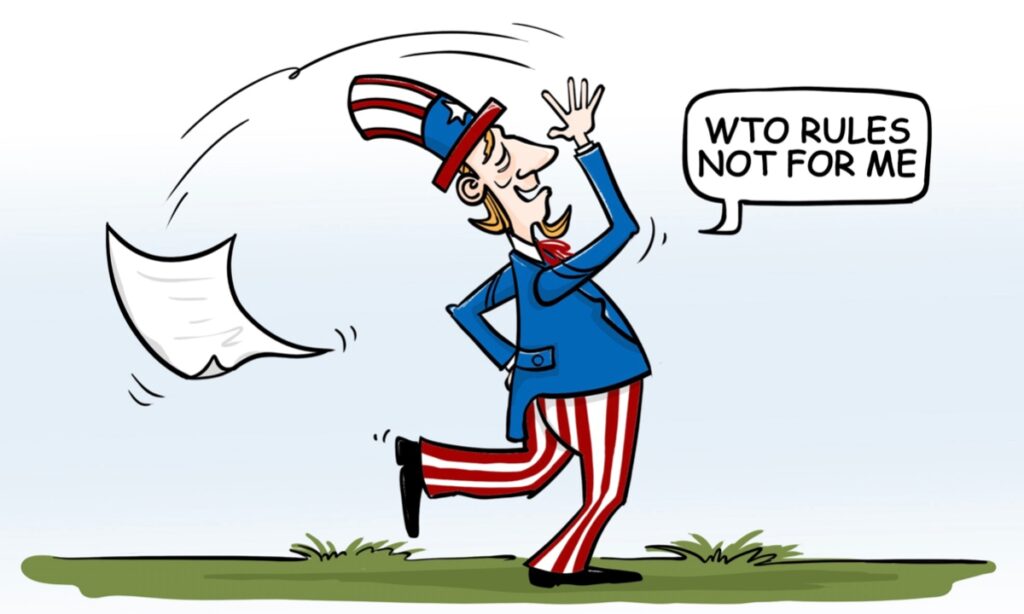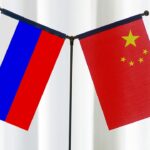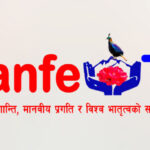While enjoying the benefits of globalization, certain Western nations have adopted protectionist policies that contradict the principles of free trade and weaken the global trading framework.
This contradictory approach encroaches on the legitimate rights and interests of other countries and jeopardizes the stability and growth of the global economy. Thus, the necessity for the WTO to play a more significant role in addressing international trade conflicts is becoming increasingly pressing.
China’s Ministry of Commerce said on Monday that it had asked the World Trade Organization (WTO) to set up a panel of experts on the dispute over new-energy vehicle (NEV) subsidies under the US Inflation Reduction Act (IRA).
China is not the only country to express concerns over the IRA, which takes the use of products from specific regions, such as the US, as the prerequisite for subsidies; excludes products from WTO members, including China; artificially erects trade barriers and pushes up the cost of the green energy transition.
The measures implemented by the US under the IRA run counter to the principle of fair competition advocated by the WTO, a destructive force that cannot be overlooked in the global trading system. These practices harm the interests of other countries and present a serious challenge to the international order.
In this context, China’s use of legal means within the framework of the WTO to seek the resolution of disputes demonstrates China’s adherence to international trade rules and its upholding of a fair trade environment, while highlighting China’s steadfast determination to safeguard its legitimate rights and interests in global trade.
China has consistently taken a responsible and cooperative approach toward addressing trade disputes, prioritizing dialogue and consultation to resolve differences. In March, China requested WTO dispute consultations with the US regarding the IRA, but the US failed to reach a solution.
China’s use of the litigation process is a rational and lawful action, while reaffirming its commitment to upholding the fairness of the global trading system.
Disputes regarding NEV subsidies have emerged as a focal point in global trade, touching on various countries’ interests and possibly shaping the future of global economic governance. The intricate nature of this dispute calls for a greater role for the WTO in ensuring the fairness of the international trading system.
The rise in trade protectionism displayed by the US and certain European countries poses serious challenges to the authority of the WTO and the equity of global trade. While criticizing others’ trade practices, some countries like the US have turned a blind eye to their own protectionism, showcasing blatant double standards.
But international trade cannot be easily controlled or manipulated by certain countries. Nor are international rules merely tools that can be manipulated by certain nations to serve their own interests. The WTO must uphold its authority and efficacy by ensuring that all member states participate in international trade on a level playing field through fair and unbiased investigations and rulings. Failures of international institutions like the WTO to effectively address trade disputes among member states could impede economic cooperation among nations and jeopardize the foundations of peaceful global development.
We hope to see countries like the US demonstrate their respect for the international order and rules through tangible actions. In the worst-case scenario, if they persist in pursuing protectionism, becoming the destroyers of the global trading system and trampling on international rules, the WTO must step up and provide a clear, fair, and impartial solution to the dispute. This is a test for the parties involved and the fairness of the global trading system.
Only when the WTO fulfills its role can the global trade system be effectively maintained, allowing countries to achieve common development on a level playing field.
Global Times




